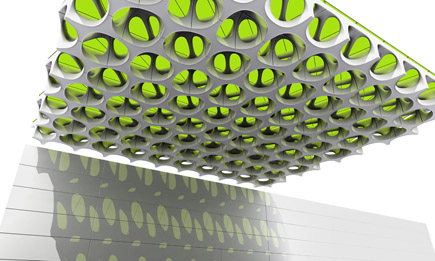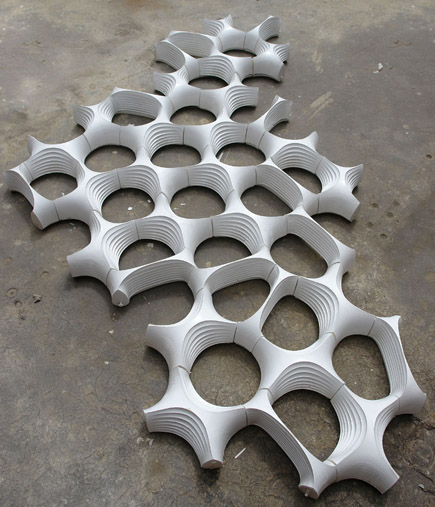
Over at WorldChanging, I’ve posted about “a decorative, three-dimensional architectural tile” by a Berlin- and London-based design firm called Elegant Embellishments.
The tiles – algorithmic in design and modular in assembly – are built to reduce vehicular air pollution, including nitrous oxide and ground-level ozone; they can thus “rapidly improve urban environments in terms of air quality and visual appeal.”
According to the company’s own press release:
The tiles are coated with titanium dioxide (TiO2), a pollution-fighting technology that is activated by ambient daylight. TiO2 is a photo-catalyst already known for its self-cleaning and germicidal qualities; it requires only small amounts of naturally occurring UV light and humidity to effectively reduce air pollutants into harmless amounts of carbon dioxide and water. When positioned near pollution sources, the tiles neutralise NOx and VOCs (volatile organic compounds) directly where they are generated. They transform previously inert urban surfaces into active surfaces, re-appropriate polluted spaces for safer pedestrian use, and invert problem spaces – dark, polluted, uninhabitable – to benevolent spaces that benefit communities.

The rest of the post explores how the tiles can be used – how they assume “endless varieties of physical structures” even whilst being “composed with only two modules.” Chemically scrubbing the air, so to speak, the grids also define respiratory oases within the city – becoming what Elegant Embellishments call “a recognizable symbol of a safer place to breathe.”

The piece ends by speculating about other, more explicitly artistic uses of the tiles – including how someone should install abstract, sculptural assemblages of them on plinths across London…
Somewhere between an alien totem pole and a new artwork by Alexander Calder, the tiles could then mark pedestrian routes and historical sites, offering residents a geometric glimpse of the city’s green future. Trafalgar Square, Berlin’s U-Bahn, even J.G. Ballard’s The Crystal World – all get thrown in for good measure.
So check it out.
TiO2 is the basic pigment of white paint — as available at your local hardware store, and to a large extent the paints derived form tinting white bases. In fact I recently noticed it as the primary colorant on the ingredient list of a Ceasar Salad Dressing in my refrigerator. So all of us with our designer white magnolia and ecru walls are scrubbing our own environments — or this is a bit of snake oil. Everybody take a deep breath — lets paint the town white!
I like the idea of putting plants in each of the holes, bus shelters & cityscapes bedecked with greenery.